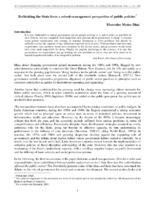Rethinking the State from a mixed-management perspective of public policies
Abstract
Current development strategies have increasingly turned to mixed management solutions as a way of overcoming the limitations of previous models in which, either the State had an excessively dirigiste development role, or - in the case of early privatization schemes,- was confined to the role of spectator with limited intervention capacity. Even if today the discussion surrounding the role of government and the definition of its functions continues, the idea that governments play an important role in the development of the economy has begun to regain legitimacy. In this sense, practice has preceded theory, and current developments show an increasing use of mixed management strategies to overcome the limitations of the two previous state models. At both national and sub-national levels of government, "Public Private Partnership" (PPPs) are increasingly being used as a means of innovating and achieving a more cost-effective delivery of public services. The paper first discusses some of the ideas and facts that have structured the debate on the role of government for social and economic development, then looking at new strategies and tools used by governments to operate more efficiently. The concept and types of PPPs are also introduced and presented in the broad context of privatization schemes. It complements these top-down perspectives by bringing part of the experiences and perceptions of public opinion around satisfaction with state services, privatizations, and how these two affect in turn trust in public and private sectors, and general support for democracy and its institutions. Finally, there is a discussion on the implications of new tools of governance for public sector reform. Starting with the conditions and critical steps necessary for building successful PPPs, the analysis then moves to some of the main implications in terms of public sector capacity and civil service reform, monitoring and evaluation tools for increased efficiency, and whether or not new public management is suited for developing countries.


